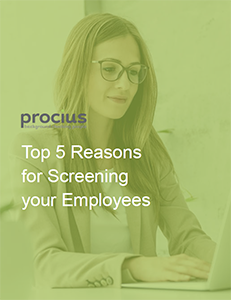Download your free version of this article
If you like this article and perhaps want to share it with your colleagues or elsewhere, why not download the pdf?
Screening candidates for a job interview is something that every company should do during the recruitment process. The purpose of background checks is to give you complete confidence in the people you are hiring. Because your employees are the most important investment you can make. Ultimately, investing in the wrong people can cost your company a lot of time and money.
Recommended checks for screening candidates include things like criminal checks, identity checks, credit checks, previous work references, education and qualification checks, and even screening a candidate’s socio-political beliefs.
Not only do these checks confirm workers are who they say they are, but the right precautions will keep your clients, staff and business safe from potential threats.
Here are the top reasons you should be screening employees:
- Fraud Prevention
More than half of all applicants will lie on their CV or on their job application. This means that it can be very easy to hire unqualified or unsuitable people if you don’t conduct background checks during the interview stage.The most common areas of fraud are things such as past employment, qualifications and skills, as well as job titles and responsibilities. These are areas that often get embellished, because applicants don’t think prospective employers will look into them.Fraud can be detrimental in many ways. It can impact on productivity, quality of work and service, and can affect everyone from your customers to other members of staff. Over time, it can seriously damage the growth of your business. Pre-employments checks can help to avoid regrettable hiring mistakes, saving your company time and money. - Data Security
With the introduction of GDPR, as well as the growth of mobile usage and connected devices through IoT (Internet of Things), the way we capture and store data is more important than ever. Not just for the purpose of legal compliance, but to provide maximum protection for the information belonging to your customers.Almost half of all data breaches come from an insider threat, and half of those are intentional. Security can be a major problem in today’s technologically advanced world, and businesses need to have measures in place to prevent intelligence theft and data loss.Screening candidates and doing criminal record checks is essential for any business that handles a high volume of customer data. This isn’t just applicable to new employees either. For any members of staff moving into a role of higher responsibility, or a position where they will be accessing sensitive information, screening is critical. - Reputation Management
Things such as data theft can really damage your brand’s reputation. As much as 70% of customers would not do business with a company after a data breach.Damage control is costly, so the best form of reputation management is prevention. There are lots of security protocols you can put into place, and screening employees should be the very first step.Another way that unscreened employees can impact reputation is poor, insufficient or inappropriate representation of your brand. It’s good to know more about the people who are acting as the face or voice of your company. This is why periodic background checks of both new and existing staff members are so important. - Protecting Your Workforce
The purpose of background checks isn’t just to protect your business – it’s to protect your workers too. As an employer, you have a responsibility to ensure that everyone who is associated with your business is protected from threats. This includes your staff and any contractors.Fraud and criminal background checks are imperative, particularly with today’s fraught political landscape. Socio-economic strains from Brexit and increasing threats of terrorism mean that it’s important to be sensitive to different ethnic, religious and political groups.Creating an open, honest work environment where colleagues are accepting of everyone’s background, religion and political views is something every business should aim for. Extremism in any form should be flagged, and thorough checks can help you detect problems before they occur.Due diligence screening will also safeguard your workforce from problems of bullying, discrimination, acts of violence or sexual harassment. Having zero tolerance against bad behaviour will improve morale, resulting in a much happier workforce and better staff retention. - Legal Compliance
One of the biggest problems to manage in any business is non-compliance. For businesses in the process of scaling, it can be particularly difficult to supervise everyone. In industries that are bound by regulatory bodies, this can be a growing issue. But one of the easiest ways to prevent problems in the first place is to hire qualified and experienced managers. By screening candidates for a job at executive level, you can avoid employing untrustworthy people or those with inadequate skills to look after a team.As an employer, you also need to ensure that your employees have the legal right to work for you. Knowingly employing illegal workers is a criminal offence, with a maximum prison sentence of five years. Employers who fail to carry out checks will face a penalty of up to £20,000 (per illegal worker).When checking a candidate’s right to work in the UK, be sure to check the following:- The type of work they are permitted to do
– How long they are allowed to work in the UK forFor businesses in the security industry that are regulated by the SIA (Security Industry Authority), you will need to conduct the necessary BS7858 security checks for every candidate.
Due to the significant threat of international terrorism, there are now also rigorous screening rules and background checks within aviation. It is essential to stay up-to-date with the regulatory boards and latest legal changes for your specific business sector.Find out more about Procius background checks for your organisation today.

